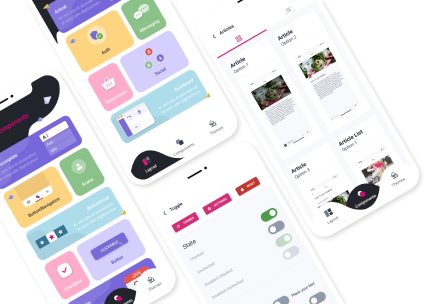Discover the Power of Outsourcing Web Development
Outsourcing web development has become an increasingly popular choice for businesses seeking to optimize their online presence and leverage the expertise of specialized professionals. In today's fast-paced digital landscape, website development outsourcing services offer a range of benefits, from cost savings to access to a global talent pool. This article explores the realm of outsourcing web development, delving into its advantages, considerations, and how it can elevate your business to new heights.

Website development outsourcing services offer a range of benefits
Understanding Outsourcing in Web Development
What does it mean to outsource web development?
Outsourcing web development refers to the practice of hiring an external company or team, often located in a different geographical area, to handle the design, development, and maintenance of websites or web-based applications. This approach allows businesses to delegate their web development tasks to specialized professionals who possess the necessary skills and expertise.
The process of finding and hiring an external team
The process of finding and hiring an external team typically involves several steps and considerations to ensure a successful collaboration. Here's a detailed explanation of the process:
- Define your project requirements: Start by clearly defining the scope, goals, and timeline of your project. Determine the specific skills and expertise you need from an external team to complement your in-house resources.
- Identify potential sources: Look for potential external teams through various channels. These can include online platforms specialized in connecting clients with freelancers or agencies, professional networks, recommendations from colleagues or industry peers, or even outsourcing companies.
- Conduct initial research: Once you have identified potential sources, conduct thorough research on each option. Visit their websites, review their portfolios, and check client testimonials or case studies to assess their experience and capabilities. Look for teams that have worked on similar projects or within your industry.
- Request proposals or quotes: Reach out to the selected teams and provide them with a clear brief detailing your project requirements. Ask them to submit proposals or quotes explaining how they will approach the project, their estimated timeline, cost structure, and any other relevant details. This will help you compare and evaluate different options.
- Evaluate proposals: Review each proposal carefully, considering factors such as price, experience, expertise, communication style, and cultural fit. Look for teams that demonstrate a deep understanding of your project, ask thoughtful questions, and propose innovative solutions.
- Conduct interviews: Shortlist the most promising candidates based on their proposals and conduct video or phone interviews. This allows you to get a better sense of their team dynamics, communication skills, and overall professionalism. Ask about their previous work, methodologies, and any concerns or clarifications you may have.
- Check references: Before making a final decision, request references from the external team. Contact their previous clients and inquire about their experiences working with the team. Ask about their reliability, ability to meet deadlines, quality of work, and overall satisfaction with the collaboration.
- Negotiate terms and contracts: Once you have selected a preferred external team, initiate negotiations on pricing, deliverables, timelines, intellectual property rights, confidentiality agreements, and any other contractual details. Ensure that both parties are clear on expectations and responsibilities.
- Sign the agreement: After reaching an agreement, finalize the contract and ensure all parties involved sign it. This legal document protects both your interests and those of the external team, establishing clear guidelines for the collaboration.
- Establish communication and project management channels: Define the preferred communication channels and project management tools to be used throughout the collaboration. This ensures effective communication, regular progress updates, and proper coordination between your internal team and the external team.
- Monitor progress and provide feedback: Throughout the project, monitor the external team's progress, provide timely feedback, and address any concerns promptly. Regular check-ins and status updates help maintain transparency and ensure that the project stays on track.
- Evaluate results and consider long-term collaboration: Once the project is completed, evaluate the results against your initial requirements and objectives. Assess the performance of the external team in terms of quality, timeliness, budget adherence, and overall satisfaction. If the collaboration proves successful, consider the potential for future projects or a longer-term partnership.
Comparison between outsourcing and in-house web development
Outsourcing and in-house web development are two approaches businesses can take when it comes to creating and maintaining their websites. Each method has its advantages and disadvantages, and the decision between the two depends on various factors such as budget, expertise, control, and time constraints.
In-house web development refers to having an internal team of web developers and designers who handle all aspects of website development within the company. This approach provides several benefits. Firstly, it allows for greater control over the entire web development process. The in-house team can closely collaborate with other departments and align the website's design and functionality with the overall business goals. Additionally, having an internal team offers more flexibility in terms of making changes or addressing issues promptly since the developers are readily available within the organization.
Furthermore, in-house web development fosters a stronger sense of ownership and internal knowledge transfer. The team becomes intimately familiar with the organization's processes, culture, and brand identity, enabling them to deliver a website that truly reflects the company's values. This deep understanding often leads to faster decision-making and easier communication, as there are no intermediaries involved.
However, in-house web development also comes with certain challenges. It requires a substantial investment in hiring skilled professionals, providing training, purchasing necessary software and hardware, and setting up infrastructure. Additionally, businesses need to be mindful of talent retention, as skilled web developers are in high demand and may be lured by external opportunities. Scaling the team according to project requirements can also pose difficulties, as it involves additional recruitment and onboarding processes.
On the other hand, outsourcing web development involves hiring an external agency or freelancers to handle the website's design, development, and maintenance. This approach offers several advantages. Firstly, outsourcing can be cost-effective, especially for smaller companies or those with limited budgets. Instead of investing in building an in-house team, businesses can leverage the expertise of external professionals at a potentially lower cost.
Outsourcing also allows companies to access a wider talent pool and specialized skills. Web development agencies often have experienced professionals with diverse backgrounds who can offer valuable insights and innovative solutions. This expertise can be especially beneficial if the business requires specific technical capabilities or wants to incorporate cutting-edge technologies into their website.
Moreover, outsourcing web development can save time. External agencies are dedicated to delivering high-quality websites on time and within agreed-upon deadlines. This frees up internal resources, allowing businesses to focus on other core activities and strategic initiatives.

There may be a loss of control over the development process
However, outsourcing does have its drawbacks. Communication and coordination may become more challenging, as the external agency may not have the same level of familiarity with the organization's processes or brand identity. Misalignment in vision or lack of effective communication can lead to delays or unsatisfactory results. Additionally, there may be a loss of control over the development process, as the business has to rely on the expertise and decisions of the external agency.
Advantages of Outsourcing Web Development Services
Outsourcing web development services present a myriad of advantages that can drive your business forward. Let's explore some key benefits:
Cost Savings: Maximizing Efficiency and Minimizing Expenses
By outsourcing web development, businesses can significantly reduce costs associated with hiring and maintaining an in-house team. This approach allows them to tap into the skills and resources of external experts without the overhead expenses. With reduced labor costs, companies can allocate their budgets effectively, focusing on other core aspects of their operations.
Access to Global Talent Pool: Unleashing Creativity and Expertise
When you opt for website development outsourcing, you gain access to a vast global talent pool comprising experienced professionals. This diverse network brings together individuals with specialized skill sets who can cater to your specific needs. Whether it's intricate design elements or complex coding requirements, you can find the right experts to bring your vision to life.
Faster Time to Market: Accelerating Your Digital Growth
Outsourcing web development services can help expedite your project timelines. With dedicated teams solely focused on your development needs, you benefit from streamlined processes and efficient workflows. This accelerated pace can give you a competitive edge, allowing you to launch your website faster and reach your target audience sooner.
Scalability and Flexibility: Adapting to Changing Business Demands
Web development outsourcing offers scalability and flexibility, empowering businesses to adapt to their evolving needs. Whether you require additional resources during peak periods or want to scale down during slower times, outsourcing allows you to leverage the expertise and manpower required without being constrained by internal limitations.
Focus on Core Competencies: Driving Business Growth
By outsourcing web development, you can redirect your internal resources towards your core competencies. Instead of investing time and effort in managing an in-house team, you can concentrate on strategic initiatives that propel your business forward. Outsourcing enables you to leverage external expertise, freeing up valuable resources for innovation and growth.
Challenges and Risks in Web Development Outsourcing
When it comes to web development outsourcing, there are several challenges and risks that businesses need to be aware of. While outsourcing can provide cost savings and access to specialized expertise, it also presents certain hurdles that need to be carefully navigated. Here, we'll explore some of the common challenges and risks associated with web development outsourcing:
- Communication and Language Barriers: One of the primary challenges in outsourcing web development is effective communication. Language barriers and cultural differences can lead to misunderstandings, misinterpretations, and delays in project delivery. It is crucial to establish clear communication channels and ensure that both parties have a shared understanding of project requirements.
- Quality Control: Maintaining quality control can be a significant risk in web development outsourcing. When you outsource a project, you entrust a third-party company or individual to deliver a product that meets your expectations. However, there is always a possibility of receiving subpar work or encountering issues with code quality, user experience, or security. Conducting thorough research, checking the outsourcer's portfolio, and setting up regular progress reviews can help mitigate this risk.
- Time Zone Differences: Collaborating with an offshore team means working across different time zones. This can introduce scheduling challenges and potential delays in communication and feedback loops. It is essential to establish a clear timetable for meetings, deadlines, and response times to ensure smooth workflow between your team and the outsourced developers.
- Data Security and Intellectual Property Protection: Outsourcing web development involves sharing sensitive information and intellectual property (IP) with external entities. There is a risk of unauthorized access, data breaches, or misuse of proprietary information. Implementing strong security measures, signing non-disclosure agreements (NDAs), and conducting due diligence on the outsourcing provider's security practices can help mitigate these risks.
- Dependency on External Providers: Relying on an external team for web development means relinquishing direct control over the process. This dependency can lead to issues if the outsourcer fails to meet deadlines, experiences financial difficulties, or becomes unresponsive. It is essential to have contingency plans in place and maintain open lines of communication to address any potential risks promptly.
- Lack of Flexibility: Outsourcing web development may limit your ability to make real-time changes and updates to the project. The time required for coordination with the external team and the potential language barriers can slow down the development process. Fostering a collaborative environment, setting clear expectations, and establishing efficient feedback loops can help mitigate this challenge.
- Long-Term Maintenance and Support: After the initial development phase, websites require ongoing maintenance, updates, and support. If the outsourced team is not available or lacks the necessary expertise for long-term maintenance, it can become a significant risk. Ensuring that the outsourcing agreement includes provisions for post-development support and maintenance is crucial to avoid future complications.
To mitigate these challenges and risks, businesses considering web development outsourcing should thoroughly research potential partners, establish clear communication protocols, develop comprehensive contracts, and maintain regular oversight throughout the project. By addressing these factors proactively, companies can maximize the benefits of outsourcing while minimizing potential drawbacks.

Businesses considering web development outsourcing should thoroughly research potential partners
FAQs About Outsourcing Web Development
- Q: What types of businesses can benefit from outsourcing web development? A: Businesses of all sizes and industries can benefit from outsourcing web development. From startups looking to establish an online presence to established enterprises seeking to optimize their digital platforms, outsourcing provides a scalable solution for diverse requirements.
- Q: How do I ensure the quality of outsourced web development services? A: To ensure quality, it's crucial to conduct thorough research and due diligence when selecting a web development partner. Look for testimonials, case studies, and portfolios that demonstrate their expertise. Consider engaging in discussions, conducting interviews, and requesting samples to assess their capabilities.
- Q: Can I maintain control over my web development project when outsourcing? A: Yes, maintaining control is essential when outsourcing web development services. Communication and collaboration are key. Establish clear project objectives, deliverables, and timelines from the outset. Regularly communicate with your outsourcing partner, providing feedback and clarifying expectations to ensure alignment throughout the development process.
- Q: Are there any potential risks associated with outsourcing web development? A: While outsourcing offers numerous benefits, it's important to be aware of potential risks. These include miscommunication, delays caused by time zone differences, and issues related to intellectual property protection. Mitigate these risks by engaging in clear contractual agreements, establishing effective communication channels, and selecting reputable outsourcing partners.
- Q: How can I maximize the success of my outsourced web development project? A: To maximize success, clearly define your project requirements and goals. Thoroughly communicate your expectations and establish a solid working relationship with your outsourcing partner. Regularly review progress, provide feedback promptly, and maintain an open line of communication to ensure alignment throughout the project lifecycle.
Conclusion
Outsourcing web development services has emerged as a powerful strategy for businesses seeking to enhance their online presence and optimize digital growth. The advantages of website development outsourcing, ranging from cost savings to access to global talent, enable companies to leverage external expertise while focusing on core competencies. By carefully selecting a reputable outsourcing partner and maintaining effective communication, businesses can unlock new potentials, accelerate growth, and gain a competitive edge in today's digital landscape.
With almost a decade of experience in software development outsourcing, Groove Technology has helped several customers from various industries worldwide. Let's discuss your project further with our experienced developers!
Related Blogs









